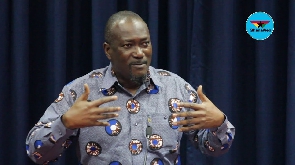 Executive Director of CDD, Professor H. Kwasi Prempeh
Executive Director of CDD, Professor H. Kwasi Prempeh
The Fiscal Responsibility Advisory Council is not strong enough to be “a domestic substitute” for the International Monetary Fund (IMF) to ensure Ghana no longer goes to the Bretton Woods institution for a bailout, the Executive Director of the Ghana Center for Democratic Development (CDD-Ghana), Professor H. Kwasi Prempeh, has said.
The President, in the exercise of his constitutional powers (Article 58), on 28 December 2018 (Ghana Gazette No. 173), established two major Councils that will offer independent advice on fiscal responsibility and ensure the stability of the entire financial system (across all the sub-sectors, from banking through pensions & fund/asset management to insurance etc.) respectively.
They are the Fiscal Responsibility Advisory Council (Fiscal Council) and the Financial Stability Advisory Council (Financial Stability Council).
Both Councils are made up of 7 members each, the latter's members being institutional representatives.
The term of the members of each Council shall lapse with the term of the President under whom s/he is appointed unless s/he resigns or is otherwise terminated/terminates before then.
Among its many functions, the FSC, which brings together all the different regulatory agencies in the financial services sector, will "identify and evaluate the threats, vulnerabilities, and risks to the stability of the financial sector," ensuring, especially, that we receive early-warning of cross-industry exposures that pose systemic risks and deploy appropriate measures in managing them.
The FC also has, as one of its functions, a mandate to "develop and recommend to the President fiscal responsibility policies for the maintenance of prudent and sustainable levels of public debt, ensuring that the fiscal balance is maintained at a sustainable level, and the management of fiscal risks in a prudent manner, to achieve efficiency, effectiveness and value for money in public expenditure."
The members of the Fiscal Council as of the time it was first established include Dr. Paul Acquah, Abdallah Ali-Nakyea, Prof. Eugenia Amporfu, Dr. Nii Noi Ashong, Prof. Augustine Fosu, Dr. Robert Osei, and Dr. Nii Kwaku Sowa.
The institutional representatives of the Financial Stability Council as of the time it was first established include Dr. Ernest Addison (BoG), Elsie Addo Awadzi (BoG), Charles Adu Boahen (who was recently fired by the President, represented the Ministry of Finance), Justice Yaw Ofori (NIC), Daniel Ogbarmey Tetteh (SEC), Hayford Atta Krufi (NPRA), and Ignatius Wilson (DPC).
Speaking at a roundtable organised by the Citizen’s Coalition in Accra on “Interrogating Ghana’s 2023 budget and Economic Policy as a pathway to Economic recovery”, Prof Prempeh said a stronger Fiscal Council could do Ghana a lot of good.
“Part of what I think has gotten us to this problem is that when we started off the Eurobond thing, it was good”, he observed, adding: “But I think that given the nature of our politics and our governance, it should have been very clear to us that we need a domestic IMF substitute”.
“That is if IMF is not there, you need, yourself, to put in certain guard rails and certain institutional frameworks so that you will be more fiscally responsible and not have to go back to the IMF,” he said.
“We have an IMF substitute on paper called the Fiscal Council and even the one that was on paper was really not that strong. If you want to go to the IMF and you are still not fiscally disciplined, it won’t work,” he said.
At the same event, Prof Prempeh said the National Cathedral is not a sensible project to undertake in the midst of an economic crisis.
In his view, the government could use the site for the project, for a more sensible venture.
“When you are in a crisis, you can do exceptional things, I don’t see anything in the budget to suggest that this is a crisis and that this is being done as an emergency measure,” Professor Prempeh said.
“This is not the time for vanity projects but we have preserved a vanity project in the form of the cathedral. I was expecting that this being a crisis period, we will reflect on that decision and say: ‘even if this is sensible to do at all’ – and I do not think so – that it will not be the appropriate period or we will change the idea to something else".
“There is a lot that we can still do with that site which can make sense”.
“So, generally it is a missed opportunity in terms of seeing this as a crisis moment and seeing it as a moment to reset the button”, Prof Prempeh noted.
“I think we have not quite done that”, he stressed.
“It looks to me that it is purely an emergency thing targeted at the IMF to approve a loan, as opposed to something that is going deep into the structure and our governance,” Professor H. Kwasi Prempeh admonished in his assessment.
Prof Prempeh is in good company with pressure group OccupyGhana which recently recommended that the government suspend all public expenditure on the National Cathedral considering that the country is going through an economic crisis.
“Whatever arguments there might have been to support spending now-non-existent money on the proposed National Cathedral, have been eroded by the dire straits that the nation faces”, the group said in a statement.
“Our current situation makes the continued commitment in the budget to spend GHS80m on the cathedral, look like a vanity project”, it noted.
OG said: “We lose nothing by suspending expenditure on that project until the economy recovers”.
The National Cathedral was a personal promise made to God by then-presidential candidate Nana Akufo-Addo if he won the 2016 election.